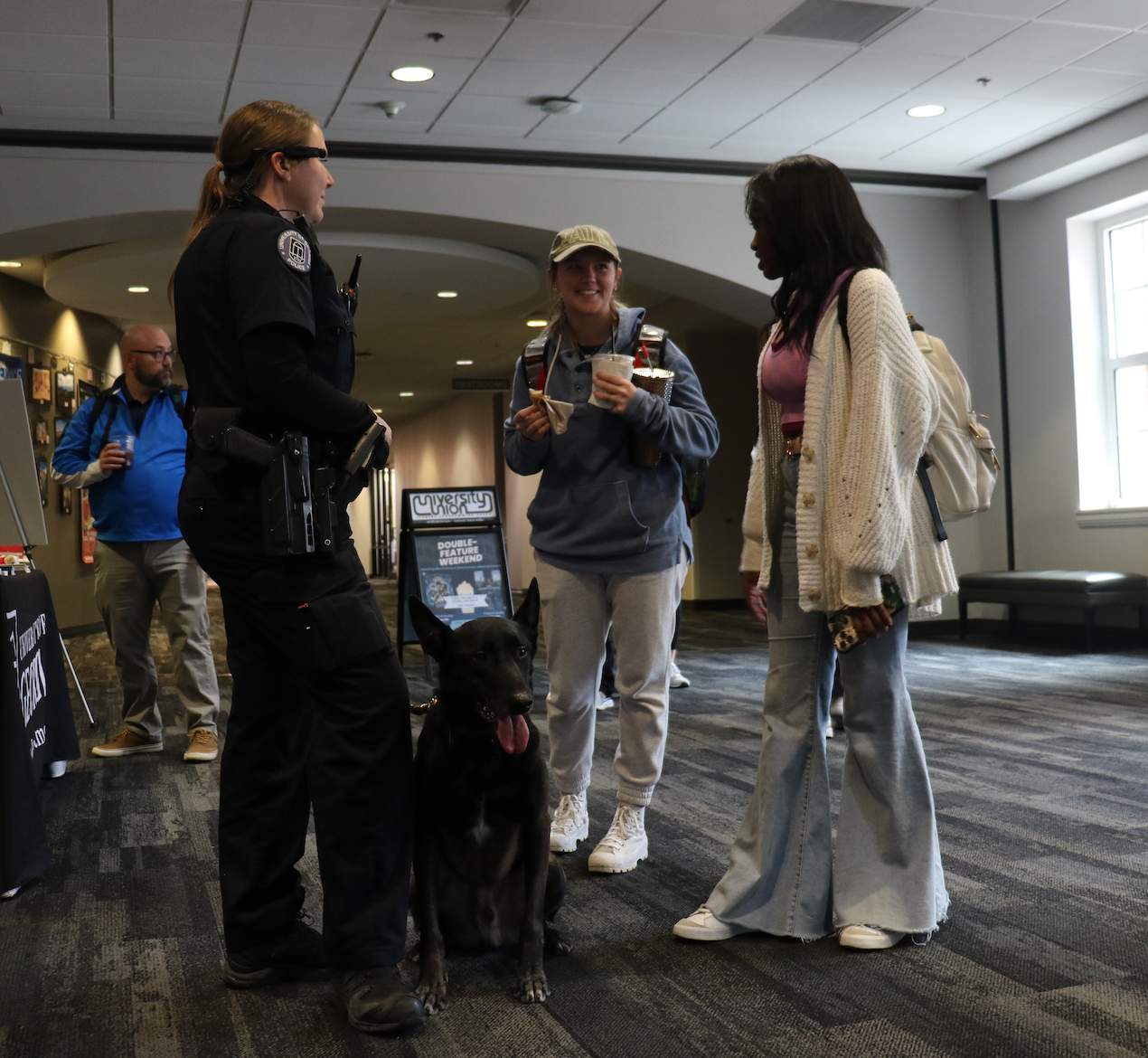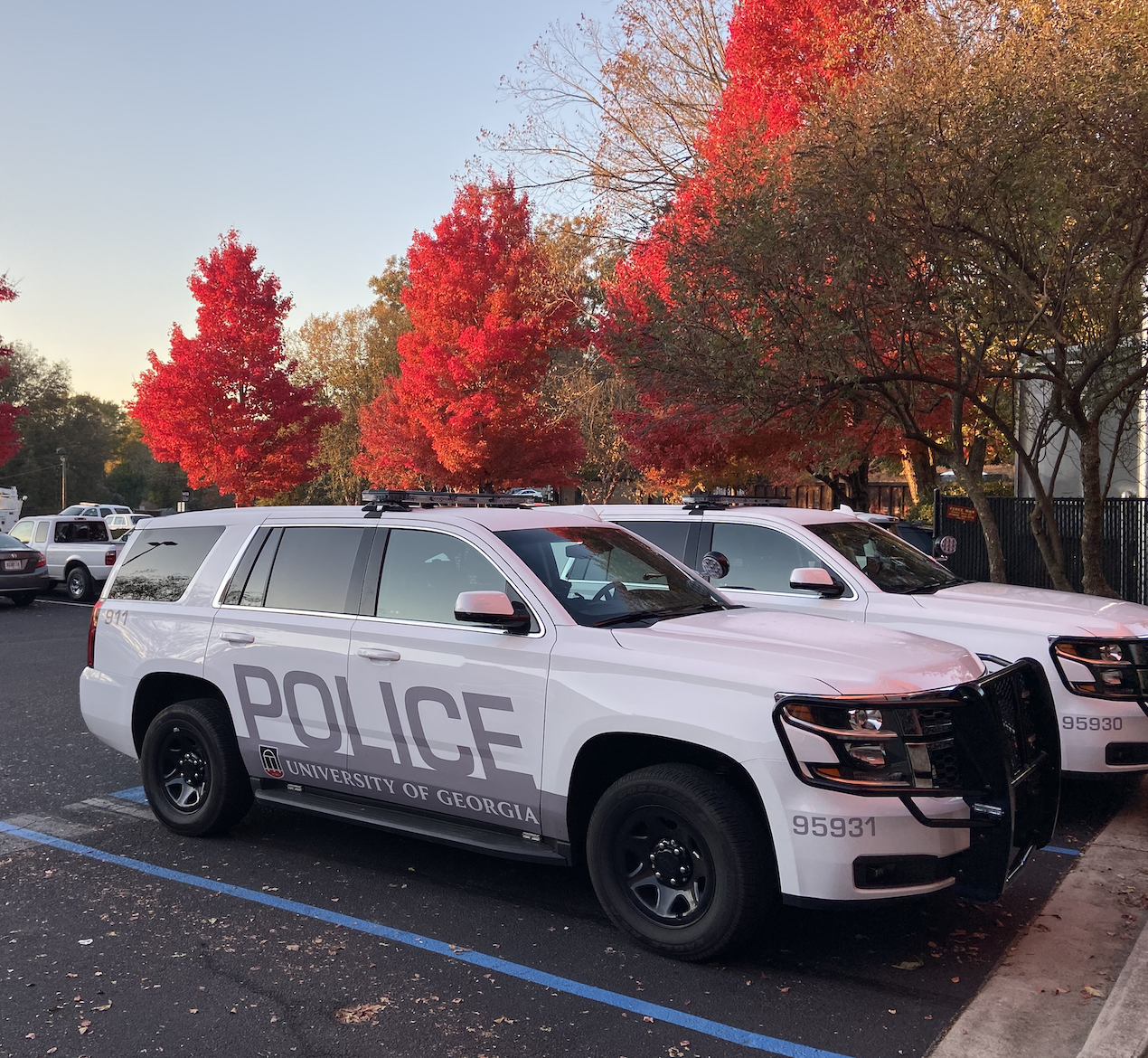Bureau of Special Operations
The Bureau of Special Operations is comprised of the specialized units the department provides for the University community and surrounding areas. The Bureau is commanded by the Deputy Chief of Special Operations and oversees the E-911 Center, Criminal Investigations Division, Support Services Unit, Explosive Ordinance Disposal Unit and the K9 Unit.
E-911 Center
The University of Georgia Police E-911 Center serves the university community 24 hours a day, 7 days a week. The center provides immediate emergency services related to police, fire, and medical calls for service. Other duties include emergency dispatch, National & Georgia Crime Information Center inquiries, telephone communications and access control systems.
The University of Georgia E-911 Center is on duty 24 hours a day, 365 days a year. Communications Officers oversee emergency telephone lines (including an emergency Telecommunications Device for the Deaf (TTY) telephone line), public safety radio frequencies, and the National / Georgia Crime Information Center database. Additionally, the E-911 Center monitors access control system responses for the campus as well as alerts from the National Weather Service Radio—issuing tornado warnings via UGA Alert to the University community when necessary.
All Communications Officers undergo extensive and continuous training to stay abreast of current technology and emergency communications techniques. This includes approximately 480 hours of on-the-job basic training for new Communications Officers, as well as the successful completion of the 20-hour Georgia Crime Information Center Terminal Operator Entry Certification Course, and the 40-hour Basic Communications Officer Training Course. E-911 personnel also take part in periodic in-house updates on departmental policies and effective emergency communications procedures. E-911 personnel may also undertake advanced training in a variety of areas, including handling domestic violence calls, suicide intervention, and hostage negotiations.
The E-911 Center on average handles more than 105,000 calls for service a year. Often the first contact one has with the University of Georgia Police Department, is the E-911 Center who endeavors to listen effectively and quickly disseminate information to the appropriate field unit, departmental office, or other public safety agency. While we hope you never find yourself in need of emergency police assistance, our E-911 personnel welcome the opportunity to serve you.
Criminal Investigation Division (CID)
The University of Georgia Police Department Criminal Investigation Division (CID) is a full-scale detective bureau equipped to handle a wide variety of investigative tasks. CID personnel are responsible for following up on all crimes reported on the University of Georgia campus, as well as numerous other tasks.
The University of Georgia Police Department’s Criminal Investigation Division (CID) is tasked with investigating a variety of criminal complaints here at the University of Georgia, as well as many University of Georgia properties throughout the State. Investigators are trained in a number of areas, including criminal investigations, interviews and interrogations, crime scene and latent fingerprint processing, homicide investigations and electronic surveillance. Each year, CID detectives investigate over one thousand criminal complaints on and around the University of Georgia campus.
Dignitary Protection / Taskforce Participation
Investigators also perform a wide variety of other investigative and administrative functions to serve the University of Georgia community. One such function is to provide protection for visiting dignitaries, who have included former U.S Presidents, foreign Heads of State, Senators, Congressmen, Supreme Court Justices and Governors. Investigators also routinely work with surrounding law enforcement agencies on multi-agency taskforces in response to crimes that affect multiple communities. Our investigators have taken part in many successful joint investigations that culminated in violent offenders being taken off the streets.
Investigative Capabilities
From death investigations to theft of property, CID has the responsibility and training to fully investigate all reported incidents. In recent years, the division routinely investigates all types of criminal complaints, including persons crimes, identity theft and computer related crimes involving the University of Georgia community. Investigators are trained in computer forensics and other techniques to effectively combat these types of crimes.
Forensic Capabilities
In addition to the CID’s investigative abilities, our division is trained and equipped to perform the majority of forensic examinations that cases may require in-house—from the collection of DNA and other biological evidence, to the identification of latent fingerprints. Investigators receive and process hundreds of pieces of evidence each year. Numerous offenders are identified and arrested as a result of this work. Other forensic capabilities of the University of Georgia Police Department include computer forensics, drug testing and identification; tire and footwear impression casting; latent fingerprint development; hair, fiber and trace evidence collection; blood pattern analysis; and general crime scene processing. Providing training to investigators in such a broad range of areas not only reduces dependence on the Georgia Bureau of Investigation Crime Lab for forensic and investigative services, but it enables the University of Georgia Police Department to provide a more thorough and timely service to the University community.



